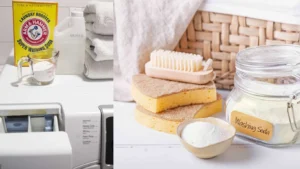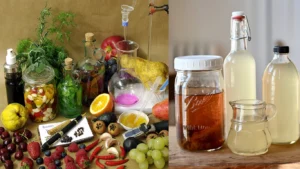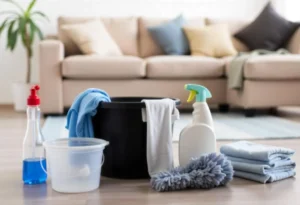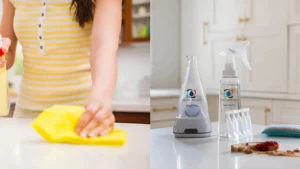How to Make The Cleaner Kitchen: 6 Tips
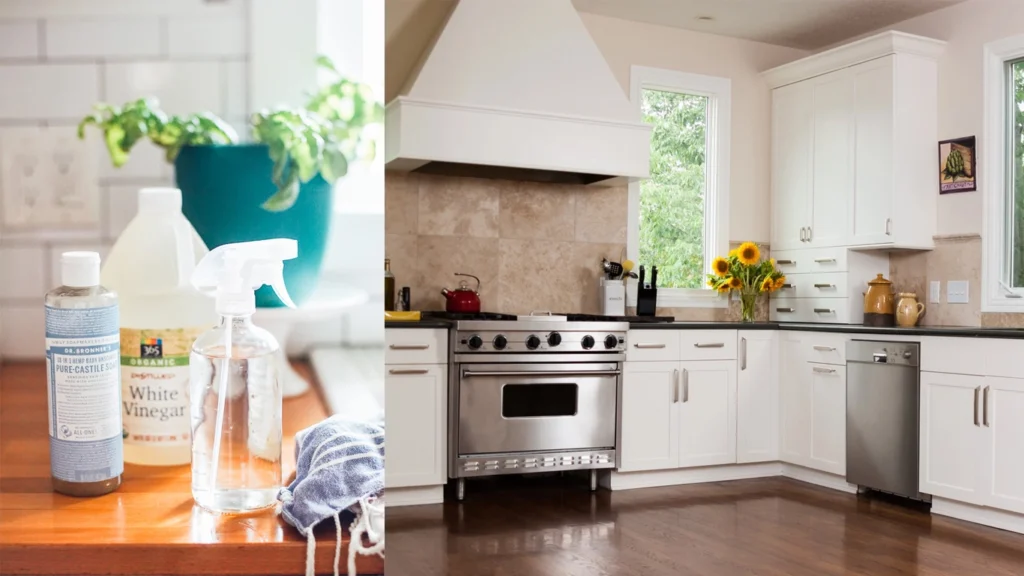
How to Make the Cleaner Kitchen: 6 Tips. Keeping the kitchen tidy is crucial for both hygienic reasons and visual appeal. While commercial cleaning products are readily available, they often contain harsh chemicals that can be harmful to your health and the environment. Fortunately, you can create effective, natural, and eco-friendly kitchen cleaners at home using simple ingredients. This guide will walk you through various homemade cleaner recipes and tips to keep your kitchen spotless.

Benefits of Homemade Kitchen Cleaners
Before diving into the recipes, let’s explore the advantages of making your own kitchen cleaners:
- Eco-Friendly: Homemade cleaners reduce the use of harmful chemicals, minimizing environmental impact.
- Cost-effective: Utilizing common household ingredients can save money compared to purchasing commercial products.
- Customizable: You can tailor the scent and strength of your cleaners to suit your preferences.
- Safe: Natural ingredients are generally safer for your family and pets.
Essential Ingredients for DIY Kitchen Cleaners
Here are some staple ingredients you’ll need:
- White vinegar: A natural disinfectant that cuts through grease and grime.
- Baking soda: removes smells and acts as a mild abrasive.
- Liquid Castile Soap: A plant-based soap that’s effective yet gentle.
- Essential Oils: Provide pleasant scents and additional antibacterial properties.
- Isopropyl Alcohol (Rubbing Alcohol): A disinfectant that evaporates quickly, leaving surfaces streak-free.
- Hydrogen Peroxide: An effective stain remover and disinfectant.
Homemade Kitchen Cleaner Recipes
1. All-Purpose Vinegar Cleaner
Ingredients:
- 1 cup white vinegar
- 1 cup distilled water
- 15-20 drops of essential oil (e.g., tea tree, lavender, or lemon)
Instructions:
- Combine vinegar and water in a spray bottle.
- Add essential oils for fragrance and enhanced cleaning power.
- Shake well before each use.
- Apply to surfaces and use a cloth to wipe clean.
Note: Avoid using vinegar-based cleaners on natural stone surfaces like marble or granite, as the acidity can damage them.
2. Baking Soda and Castile Soap Scrub
Ingredients:
- 1 cup baking soda
- 1/4 cup liquid castile soap
- 10 drops of essential oil (optional)
Instructions:
- In a bowl, combine castile soap and baking soda to make a paste.
- Add essential oils if desired.
- Using a cloth or sponge, apply the paste to surfaces.
- Scrub gently and rinse with water.
This scrub is excellent for cleaning sinks, stovetops, and other areas with stubborn stains.
3. Citrus-Infused Vinegar Cleaner
Ingredients:
- Peel of 2-3 oranges or lemons
- White vinegar
- Distilled water
Instructions:
- Put the orange peels in a jar and pour vinegar over them.
- Seal the jar and let it sit for 1-2 weeks to infuse.
- Strain the liquid into a spray bottle.
- Dilute with an equal amount of distilled water.
- Shake well before use.
The citrus oils enhance cleaning power and leave a fresh scent.
4. Alcohol-Based Disinfectant Spray
Ingredients:
- 1 cup isopropyl alcohol (70% concentration)
- 1 cup distilled water
- 10 drops of essential oil (e.g., tea tree or eucalyptus)
Instructions:
- Combine alcohol and water in a spray bottle.
- Add essential oils.
- Shake well before use.
- Before cleaning, mist surfaces and allow them to sit for a few minutes.
This disinfectant is suitable for high-touch areas like countertops and appliance handles.
5. Hydrogen Peroxide Stain Remover
Ingredients:
- 1 cup hydrogen peroxide (3% concentration)
- 1/2 cup baking soda
- 1 teaspoon liquid dish soap
Instructions:
- Mix all ingredients to form a paste.
- Apply to stained areas, such as grout or cutting boards.
- Let it sit for 5-10 minutes.
- Scrub with a brush and rinse thoroughly.
Hydrogen peroxide is effective in removing stains and disinfecting surfaces.
Tips for Using Homemade Kitchen Cleaners
- Test Surfaces: Before using a new cleaner, test it on a small, inconspicuous area to ensure it doesn’t cause damage or discoloration.
- Proper Storage: Store cleaners in labeled spray bottles away from direct sunlight and out of reach of children and pets.
- Regular Maintenance: Regular cleaning prevents the buildup of grime, making your cleaning routine more manageable.
- Avoid mixing certain ingredients. For example, mixing vinegar and hydrogen peroxide can create peracetic acid, which can be harmful. Always research before combining ingredients.
Conclusion
Creating your own kitchen cleaners is a simple and rewarding endeavor that promotes a healthier home and environment. With basic household ingredients, you can tackle various cleaning tasks effectively and safely. Embrace these natural solutions to maintain a sparkling, clean kitchen without relying on harsh chemicals.

